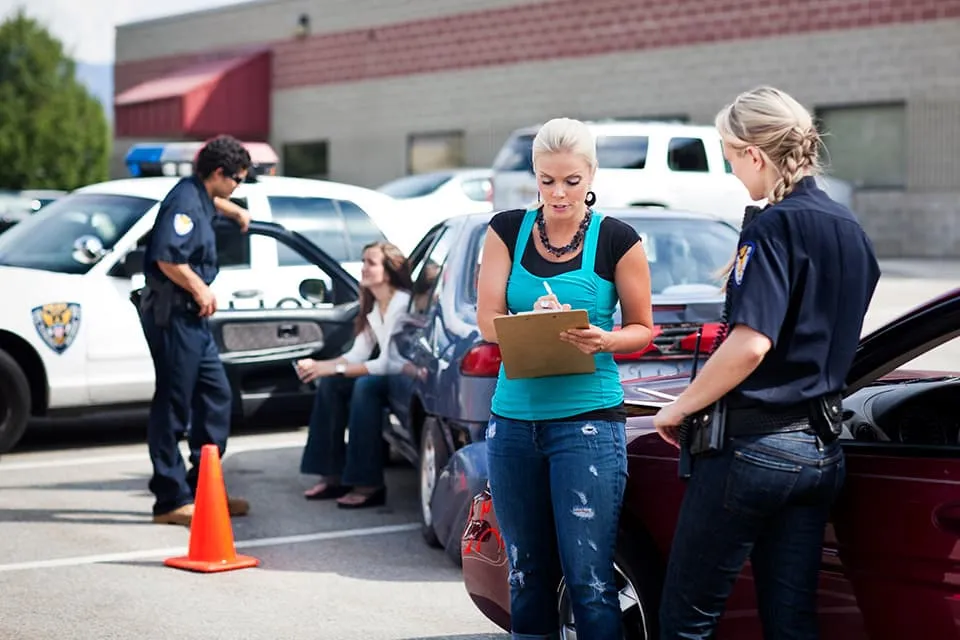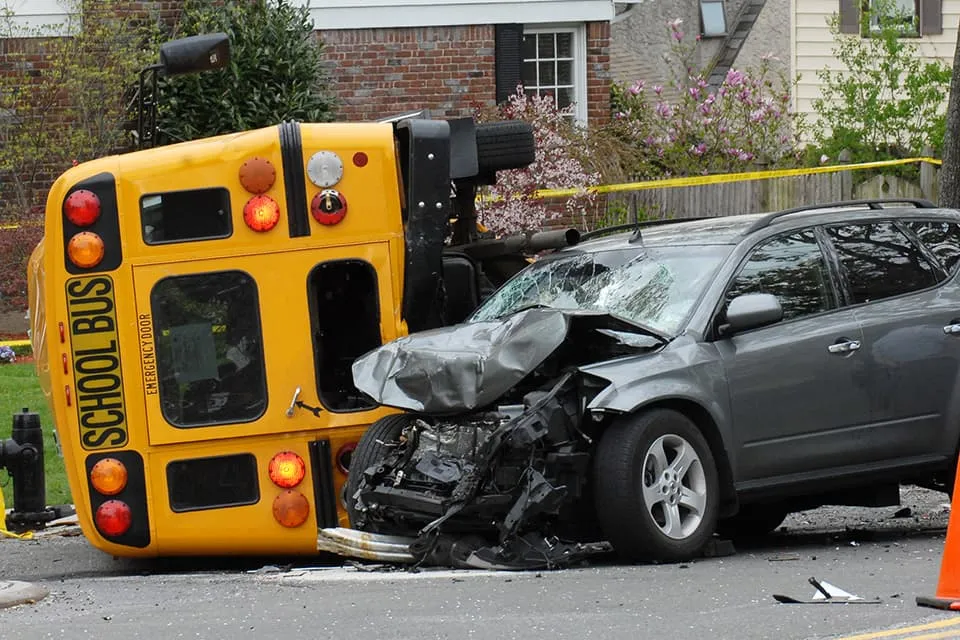What is a Car Accident Report?

Car crashes can be a harrowing experience, a the best step to take immediately after is to call 911. Once a police officer arrives, they will fill out a document known as a car accident report. These reports are used by law enforcement agencies to investigate accidents; these reports include a variety of important details relating to the crash itself.
What Is In a Car Accident Report?
- Location: The area the crash occurs in will be listed in detail in a car accident report. This includes the state and county, along with the current weather conditions, traffic, lighting, and a description of the accident's immediate surroundings (i.e. near a bridge, near an intersection, etc.)
- Date and Time: The day, month, and year of the accident will be listed, along with what time of day the collision occurred. This can help officers determine whether the accident occured in a low-light environment, or if the sun could have played a part in obscuring either driver's vision.
- Involved Parties: Everyone involved in the accident will be listed along with their name, address, phone number, date of birth, and any other details the officers deem necessary to their investigation. Involved parties can also include bystanders and nearby pedestrians, who may be asked to provide their details and statement about the accident to law enforcement.
- Driver Information: After the accident the driver will need to provide their licenses, registrations, proof of insurance, and any other documents proving they are legally allowed to operate a motor vehicle.
- Law Violations: Any laws that were violated during the accident will be listed, along with current citations either driver has on their vehicle.
- On-Scene Notes: Law enforcement officers will usually include their own opinions about the crash on a vehicle accident report, including who they believe is at fault and what factors led to the accident.
How To Write a Car Accident Report
You don't write a car accident report at all; a law enforcement officer will make the report at the scene. Your responsibility lies in reporting the crash itself. Most states legally require any witness or participant in an accident to report it immediately by calling 911 if the crash meets any of the following requirements.
Requirement #1: Injury or Fatality

If the crash was severe enough to cause a car accident injury, or if any of the involved parties died as a result of the collision, you are legally required to report the accident immediately.
Requirement #2: The Damage Costs Exceed State Criteria
When an accident occurs where significant damage is done to one or more vehicles, and that damage exceeds a certain cost level, the crash must be reported as soon as possible. Different states have different criteria for what this level is, but if you see that major systems within the vehicle are non-functioning or destroyed it's reasonable to assume this level has been exceeded.
Requirement #3: A Crime Was Committed During or After the Accident
If any crime was perpetrated during or as a result of the accident, you must call 911 to report the crash as quickly as possible. Examples of this would be if one or more of the drivers appears to be intoxicated and operating their vehicle under the influence. Another common crime committed after accidents is what's known as a "hit and run"; this is when a driver involved in a crash leaves the scene before exchanging information or waiting for law enforcement officers to arrive.
Requirement #4: If a Commercial Vehicle was Involved

If one or more of the parties involved in the crash were driving a commercial vehicle, the accident must be reported immediately. Commercial vehicles are defined as any vehicle used for the transport of goods or paying passengers. This includes:
- Buses
- Semi-Trucks
- Tow-Trucks
- Taxis
- Travel Trailers
- Vans
- Box Trucks
Requirement #5: A Vehicle is Disabled
If the accident causes significant enough damage to require a tow-truck or wrecker to retrieve it, the vehicle accident has to be reported as soon as possible. This usually occurs if any major system is disabled, like power to the engine, steering or brakes.
Car Accident Report Frequently Asked Questions
Can You File a Police Report After an Accident
If the crash was minor and does not meet the requirements above, you can file an accident report on your own. This can be done by visiting your local DMV website and filling out an accident report online. You can also send in an accident report by printing forms out and mailing them to the DMV. Whichever method you choose, be sure to keep a copy of your report to give to your insurance company.
How to Get a Police Report for a Car Accident?
If you want a copy of the vehicle accident report or police report filled out at the scene, there are a few simple steps to follow.
- Get the Police Report Identification Number: This is usually done at the scene of the accident after the officer has filled out their accident report. The responding officer will usually provide this paperwork automatically, but if they don't, make sure to ask.
- Make a Copy Request: Call the law enforcement officer responsible for making the car accident report and put in a crash report request. You may also need to talk to the traffic division of their offices directly.
- Pay a small fee: Obtaining a copy of your report usually means paying a small administrative fee, anywhere between $10 and $30. Ask the law enforcement or traffic division office what this fee is ahead of time. Once you put in your request and pay, you should receive your copy electronically or by mail in a couple of weeks.
Does My Insurance Company Need My Crash Report?
Any documentation of your crash will be helpful to your insurance company. This includes:
- Car crash reports
- Accident reports
- Dash cam footage
- Any testimony from involved parties/witnesses
In addition to the police investigation, those involved often file a car insurance claim prompting insurance companies to launch their own investigation into the crash and any associated claims. Much like the police inquiry, the insurance investigation is conducted to find out who is at fault. Sometimes the insurance companies will come to a different conclusion than the police. Even if the cops believe you are not at fault, an insurance company may see otherwise and deny your claim.
Who is Responsible for Filing an Accident Report?
If an accident is severe enough to require a law enforcement agent, they will be responsible for filing a crash report. This is usually when the involved parties have been injured or killed, the accident results in significant vehicle damage, or a crime was committed. If the accident is not severe enough to require intervention by law enforcement, the involved parties are required to file an accident report. This is different from a crash report, which has details specific to a police investigation. An auto accident report will usually ask for driving credentials, insurance, full legal name of the involved parties, and a description of what occurred.
How Much Does Insurance Increase After An Accident
Unfortunately a car crash will likely affect your current insurance rates. Insurance premiums can increase by 20% to 40% after an at-fault accident, but the exact rise depends on factors like the accident's severity, the driver's history, and location. Drivers with no prior accidents or with "accident forgiveness" may see smaller increases. The increase is percentage-based, so the impact varies by your current premium's dollar amount. For specifics, it's best to consult your insurance provider.
Does a Car Accident Affect Your Credit Score
Yes, a car crash can affect your credit score. If the accident resulted in any medical bills, and your insurance company decides they will not cover these, they may go to collections. As a result, your credit score will likely take a hit.
Where Can I Get More Information About a Vehicle?
If your car is damaged significantly in a crash, you may be considering purchasing a new or used car to replace it. siasing a car is no easy task,and usually involves hours of comparing quotes and sifting through boring vehicle documents. Unfortunately proper research is an essential part of purchasing a car; if you don't look into a vehicle before you buy it, you'll rarely get the car you are looking for.
The best way to research a car is by getting a vehicle history report. These easy-to-read and comprehensive reports will provide you with all the essential details you need to make an informed car-buying decision. If you want to find a history of crashes or accidents, the number of previous owners a vehicle had, or information on whether a car has ever been stolen or used in a crime, a vehicle history report can help. By getting all this information ahead of time you can prevent yourself from overpaying for a vehicle, or even worse, falling prey to a car-buying scam.
FREE Vehicle Search
- Accidents
- Problem Checks
- Title Records
- Recalls
- Values
- Specs
-
InfoPay, Inc. (dba GoodCar) is an Approved NMVTIS Data Provider
-
-






























